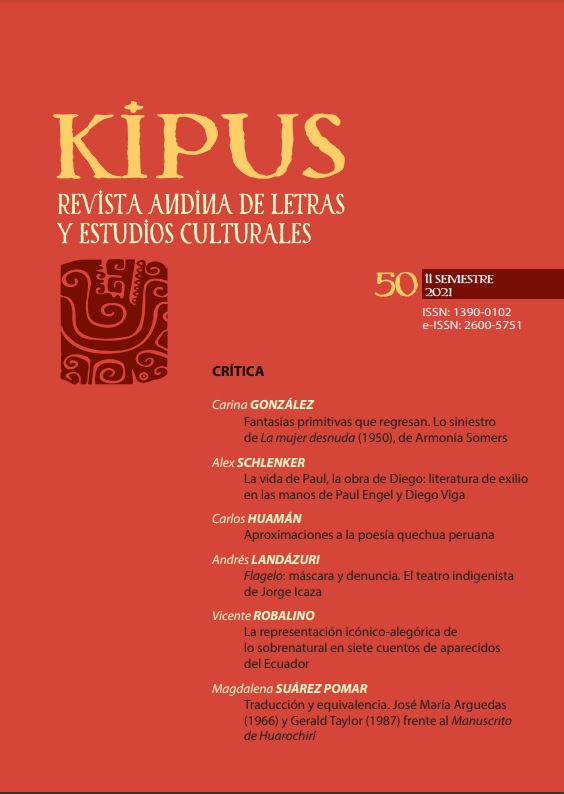Paul’s life, Diego’s work: Exile Literature in the Hands of Paul Engel and Diego Viga
DOI:
https://doi.org/10.32719/13900102.2021.50.2Keywords:
Diego Viga, Paul Engel, literature, National Socialism, exile, Jewish, Ecuador, Colombia, novel, short story, autobiographyAbstract
Drawing from various historical contexts and with the help of his autobiography, this article elaborates a cartography of the contact zones between the life and work of the Austrianborn Jewish writer Paul Engel who, under the pseudonym of Diego Viga, published during his exile in Colombia and Ecuador some twenty novels, a hundred short stories, and several essay and theater titles between the 1930s and 1980s.
Downloads
References
Benjamin, Walter. s. a. [1942]. “Sobre el concepto de historia”. Traducido por Bolívar Echeverría. Documento digital. www.archivochile.com.
Castro-Gómez, Santiago. 2005. La hybris del punto cero: ciencia, raza e ilustración en la Nueva Granada. 1750-1816. Bogotá: Editorial Javeriana.
Césaire, Aimé. 2007. Discurso sobre el colonialismo. Madrid: Akal.
Eagleton, Terry. 1988. Una introducción a la teoría literaria. Buenos Aires: Fondo de Cultura Económica.
Eisenbürger, Gert. 2010. Zuflucht in Quito: Lilo Linke und Paul Engel (Diego Viga) integrierten sich schreibend in Ecuador. http://www.ila-web.de/archiv/2010/337inhalt.htm.
Eloy Martínez, Tomás. “Novela significa licencia para mentir”, entrevistado por Juan Neyret. Universidad Nacional de Mar del Plata. Documento digital.
Engel, Paul. 2011 [1995]. Unos pocos incluso llegaron a ser felices (Manche werden sogar glücklich...). Autobiografía inédita de Paul Engel (Diego Viga). Traducido por Alex Schlenker. Quito.
Felden, Dietmar. 1987. Diego Viga. Leipzig: Hirzel Verlag.
Finkielkraut, Alain. 2001. La ingratitud. Conversaciones sobre nuestro tiempo. Barcelona: Anagrama.
Gadamer, Hans Georg. 1992. Verdad y método. Salamanca: Ediciones Sígueme.
Hackl, Erich. 2007. “Zur Rechten Zeit, Aufforderung, endlich Diego Viga wahrzunehmen”. Zwischenwelt 24, 1-2, octubre.
Halbwachs, Maurice. 2004. Los marcos sociales de la memoria. Barcelona: Anthropos.
Koebner, Thomas, et al. 1986. “Prefacio”. En Das jüdische Exil und Andere Themen, Exilforschung, ein internacionales Jahrbuch / hg. Im Auftrag d. Ges. für Exilforschung. Edition Text + Kritik, Band 4.
Marzouk El-Ouarichi, Kais. 1991. “Acontecimiento”. Universidad de Fez. Documento digital.
Peña-Ardid, Carmen. 1999. Literatura y cine: una aproximación comparativa. Madrid: Cátedra.
Pienknagura, Teresa. 2012. Entrevista realizada por Alex Schlenker, 1 de septiembre.
Ribadeneira, Edmundo. 1985. Prólogo. En Diego Viga, Catorce ensayos. Colección Básica de Escritores Ecuatorianos. Quito: Casa de la Cultura Ecuatoriana.
Rosten, Leo. 1968. The Joys of Yiddish. Londres: W. H. Allen Ltd.
Stam, Robert, y Alessandra Raengo, editores. 2004. Literature and film: a guide to the theory and practice of film adaptation. Malden: Blackwell.
Schlenker, Alex. 2020. Working paper #32: Publikationsliste Diego Viga. https://www.academia.edu/45051138/WORKING_PAPER_Nr_32_Publikationsliste_Bibliograf%C3%ADa_Diego_Viga.
Schneider, Bernhard. 1999. Daniel Libeskind, Jewish Museum Berlin. Munich: Prestel Verlag.
Viga, Diego. 1963. El año perdido. Quito: Editorial Universitaria.
–––. 1985. “La novela que vive el novelista”. En Catorce ensayos. Colección Básica de Escritores Ecuatorianos. Quito: Casa de la Cultura Ecuatoriana.
–––. 2010. Entrevistado por Patricio Viteri Paredes.
–––. 2012. El pintor del Rey y otros cuentos. Quito: La Palabra Editores.
Viteri Paredes, Patricio. 2010. “Introducción”. En Diego Viga, El pintor del Rey y otros cuentos. Quito: La Palabra Editores.
Weilbauer, Arthur. 1975. Los alemanes en el Ecuador: Estudio histórico. Quito: Colegio Alemán.
Downloads
Published
How to Cite
Issue
Section
License

This work is licensed under a Creative Commons Attribution-NonCommercial-ShareAlike 4.0 International License.







.png)
